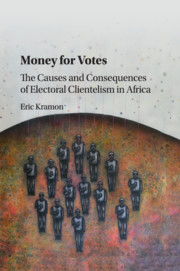Book contents
- Frontmatter
- Contents
- List of Tables
- List of Figures
- Acknowledgments
- Part I The Puzzle of Electoral Clientelism
- Part II Empirical Evidence
- 4 The Mechanics of Electoral Clientelism: Descriptive Evidence
- 5 Why is Electoral Clientelism Effective?: Experimental Evidence
- 6 Who Invests in Electoral Clientelism?: Incumbents versus Challengers
- 7 Electoral Clientelism and Ethnic Politics
- 8 Electoral Clientelism and the Provision of Local Public Goods
- 9 Conclusion
- Appendices
- Bibliography
- Index
4 - The Mechanics of Electoral Clientelism: Descriptive Evidence
from Part II - Empirical Evidence
Published online by Cambridge University Press: 26 October 2017
- Frontmatter
- Contents
- List of Tables
- List of Figures
- Acknowledgments
- Part I The Puzzle of Electoral Clientelism
- Part II Empirical Evidence
- 4 The Mechanics of Electoral Clientelism: Descriptive Evidence
- 5 Why is Electoral Clientelism Effective?: Experimental Evidence
- 6 Who Invests in Electoral Clientelism?: Incumbents versus Challengers
- 7 Electoral Clientelism and Ethnic Politics
- 8 Electoral Clientelism and the Provision of Local Public Goods
- 9 Conclusion
- Appendices
- Bibliography
- Index
Summary
Voting is based on the secret ballot. So there is no way the aspirant will know that you did not vote for him. Even if he knew that I did not vote for him, he will still not be able to punish me. It is very difficult.
Interview respondent in Machakos, Kenya, January 2015No, [accepting money from one candidate and voting for another] is not immoral, after all no force is used upon an aspirant in order to give out money. Politicians give out money willingly.
Interview respondent in Kakamega, Kenya, January 2015Survey data highlight the prevalence of electoral clientelism to political campaigns in Kenya. In all regions of the country, politicians invest substantial amounts of money in allocating handouts to voters. What the survey data cannot tell us, however, is what electoral clientelism looks like in action. This chapter therefore examines the “mechanics” of electoral clientelism, addressing questions about how electoral clientelism is experienced in the context of political campaigns in Kenya. For example: where and how does electoral clientelism happen? Do politicians’ agents seek to monitor the voting behavior of those who receive handouts? Do voters think that they are being monitored? Do voters feel a moral responsibility to vote for those who give them handouts?
In addressing these questions, this chapter provides descriptive evidence that supports the informational theory. As I outline in Table 3.1, the theory generates a set of expectations about what electoral clientelism should look like in practice—where it happens, how voters get targeted, and what the relationships are between those who distribute handouts and those who receive them. To test these implications, I provide qualitative evidence from semi-structured interviews with voters and quantitative evidence from original surveys.
The evidence is consistent with the informational theory. It is also at odds with alternative explanations for the electoral effectiveness of electoral clientelism. For example, the first quote in the epigraph casts doubt on one plausible explanation: that parties directly enforce vote-buying transactions by violating ballot secrecy, or inferring how people vote, and credibly threatening to punish or deny future benefits to vote sellers that do not follow through with their end of the bargain. This Kenyan, a 24-year old woman who received 200 shillings at a political rally before the 2013 elections, expresses doubts that ballot secrecy might be violated and that parties can credibly punish voters.
- Type
- Chapter
- Information
- Money for VotesThe Causes and Consequences of Electoral Clientelism in Africa, pp. 69 - 94Publisher: Cambridge University PressPrint publication year: 2017

